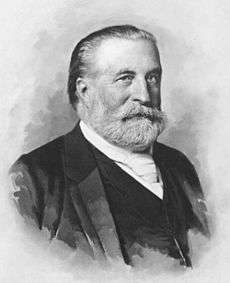Ernst von Bergmann
| Ernst Gustav Benjamin von Bergmann | |
|---|---|
|
Ernst von Bergmann | |
| Born |
16 December 1836 Riga, Livonia Governorate |
| Died |
25 March 1907 (aged 70) Wiesbaden |
| Nationality | Baltic German |
| Fields | Surgeon |
| Institutions | University of Berlin |
| Alma mater | University of Dorpat |
| Known for | Sterilisation of surgical instruments and Hydrocolectomy |
| Wikimedia Commons has media related to Ernst von Bergmann. |
Ernst von Bergmann (16 December 1836 – 25 March 1907) was a Baltic German surgeon. He is a pioneer of aseptic surgery.
Biography
Born in Riga, Livonia Governorate (now Latvia), in 1860 he earned his doctorate at the University of Dorpat. Afterwards, he was an assistant at the surgical clinic and habilitated for surgery under Georg von Adelmann (his future father-in-law) and Georg von Oettingen (1864). From 1871 to 1878 he was a professor of surgery at Dorpat. After spending a few years as a professor at Würzburg, he relocated to the University of Berlin as a successor to Bernhard von Langenbeck (1882).[1] He served as a professor of surgery at Berlin for the remainder of his career. Two of his assistants in Berlin were Curt Schimmelbusch (1860–1895) and Friedrich Gustav von Bramann (1854–1913).[2] His son, Gustav von Bergmann (1878–1955) was a noted doctor of internal medicine.
Contributions
Bergmann was the first physician to introduce heat sterilisation of surgical instruments, thus greatly reducing the number of infections in surgery.[3] Thus increased the responsibility of the surgeon for the inflammation after procedures. He also used steam sterilized dressing material, demonstrating its superiority to chemical antisepsis.[2] He was also an early adopter of the "white coat".[4]
He served as a medical officer in the Austro-Prussian War (1866), the Franco-Prussian War (1870–71) and the Russo-Turkish War (1877–78), gaining valuable experience in regards to the treatment of wounded soldiers. He was deeply interested in the etiology and pathogenesis of diseases associated with battle-related wounds.[2] In his role as a medical officer, he expressed the need for a well-trained ancillary and nursing personnel and also for the implementation of a modified procedure for handling gunshot wounds, in particular, wounds involving the joints and cranium.[5]
He was also a pioneer of hydrocolectomy (hydrocele operation), made contributions towards the development of the technique for appendectomy and is credited with performing the first successful operation for esophageal diverticulum.[2]
He was the author of numerous medical and surgical works, including a classic treatise on head injuries, titled Die Lehre von den Kopfverletzungen (1880) and a book on brain surgery, titled Die Chirurgische Behandlung der Hirnkrankheiten (1888).[2] In 1904, with Martin Kirchner and Robert Kutner, he was co-founder of the Zeitschrift für ärztliche Fortbildung ("Journal of Medical Education").[6]
With Friedrich von Bramann and English physician Morrell Mackenzie (1837–1892), he attended to Frederick III (1831–1888), when the emperor was dying of laryngeal cancer. Bergmann died in Wiesbaden. Today, the Ernst von Bergmann Clinic in Potsdam,[7] the Ernst-von-Bergmann-Kaserne in Munich, and the Ernst von Bergmann Plaque of the German Medical Association, are named in his honor.
 Bergmann and his assistants in "white coats" (c.1897)
Bergmann and his assistants in "white coats" (c.1897)- Monument of Bergmann in Tartu (former Dorpat).
See also
Footnotes
- ↑ Zeno,org Pagel: Biographical Dictionary outstanding physicians of the nineteenth century. Berlin, Vienna 1901, Sp. 141-144.
- 1 2 3 4 5 Bergmann, Ernst Gustav Benjamin von @ NDB/ADB Deutsche Biographie
- ↑ History of Infection Control and its Contributions to the Development and Success of Brain Tumor Operations Neurosurgical Focus 2005;18(4):1-5
- ↑ Hardy, Susan and Corones, Anthony, "Dressed to Heal: The Changing Semiotics of Surgical Dress", Fashion Theory, (2015), pp.1-23. doi=10.1080/1362704X.2015.1077653
- ↑ Life and work of the surgeon Ernst von Bergmann (1836-1907), long-term editor of the "Zentralblatt für Chirurgie" NCBI; Zentralbl Chir. 2000;125(6):552-60.
- ↑ “Zeitschrift für ärztliche Fortbildung und Qualität im Gesundheitswesen” Elsevier-Germany Online Journals
- ↑ Polyclinic Ernst von Bergmann
References
- Blair, J S G (June 2006). "Ernst Von Bergmann". Journal of the Royal Army Medical Corps. 152 (2): 108–9. PMID 17175776.
- Czymek, R; Düsel W (March 2007). "[On the centennial of Ernst von Bergmann's death]". Der Chirurg; Zeitschrift für alle Gebiete der operativen Medizen. 78 (3): 265–8, 270–2. doi:10.1007/s00104-006-1299-8. PMID 17287931.
- Luther, B; Wirth I (1986). "[The development of surgery by Ernst von Bergmann]". Zentralblatt für Chirurgie. 111 (22): 1389–97. PMID 3548162.
- Salcman, M (1996). "Ernst von Bergmann performs a brain operation by Franz Skarbina". Neurosurgery. 38 (6): 1254–5. doi:10.1227/00006123-199606000-00046. PMID 8727161.
- Zimmermann, M (2000). "[Life and work of the surgeon Ernst von Bergmann (1836–1907), long-term editor of the "Zentralblatt für Chirurgie"]". Zentralblatt für Chirurgie. 125 (6): 552–60. PMID 10919251.
